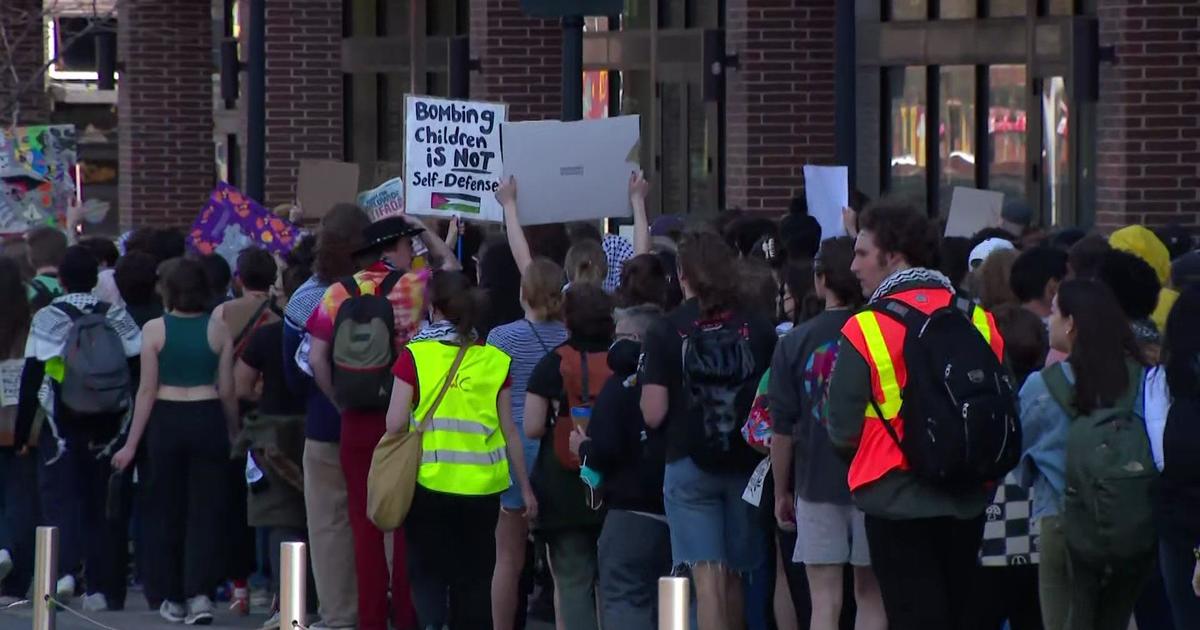Tina Smith: 2020 Election Guide
Welcome to WCCO.com's 2020 political guide!
We reached out to all Minnesota candidates running for U.S Senate and U.S Congress this fall. Candidates were asked to provide a two-minute video discussing their platform as well as answer a set of our viewers' questions.
Above is the video and below are the answers Tina Smith provided. This is not a paid advertisement nor does WCCO endorse any candidate.
Responses from Tina Smith, Democratic candidate for U.S. Senate:
Do you believe racial disparities exist in Minnesota and across the country? If so, what policy changes would you propose to combat this?
Racial disparities exist in Minnesota, and across our country. Just look at the coronavirus, where we're seeing the virus disproportionately affect communities of color. A Minnesotan put it in a way that has stuck with me: "we are all in the same storm, but not all in the same boat." We need to address disparities in health care, and we need to improve economic equity by increasing access to credit, homeownership, education and workforce opportunities too.
We also need to make systemic reforms to policing, so that all Minnesotans--especially Black, Indigenous, people of color--feel safe in their communities.
Some of the ways we can do this are by passing the Justice in Policing Act--legislation I helped introduce to make common sense reforms to policing, and to hold accountable police officers that use excessive force and violate people's rights. We also should pass my Supporting Innovation in Public Safety Act, which would help state, local, and Tribal governments implement innovations in policing, such as establishing violence prevention strategies or co-responders with law enforcement for people experiencing a mental health crisis.
Do you believe the federal government's handling of the COVID-19 pandemic has been adequate? If not, what could have been done differently? Do you believe there should be a national mask mandate?
The Trump administration failed to create a strong national strategy for testing and contract tracing, and for getting personal protective equipment to first responders. That has hurt our response, and contributed to the United States having a much worse record for infections and fatalities compared to countries like Japan and Germany. Now I'm working with Republicans and Democrats to put in place a national strategy for testing and contact tracing, and to make sure that COVID vaccines, when proven safe and effective, are free to everyone.
On the good side, Congress passed strong bipartisan legislation in the CARES Act, which provided $2.2 trillion in support to families, including $1,200 to adults and $500 for children 17 and under. We provided enhanced unemployment benefits to people who lost their jobs and direct help to small businesses and their employees through the Paycheck Protection Program (PPP). This bipartisan law also provided financial support to local hospitals and health clinics, and nearly $340 billion to help state, local and tribal governments respond to the COVID crisis.
Still, this crisis isn't over, and there's more work to do. We need to pass additional COVID-19 relief to support Americans who remain unemployed and small businesses that are still struggling. We must get additional help to schools, and to state, local and Tribal governments that face cuts to health, education and other vital public services without further aid. We also need to get much-needed aid to the Postal Service.
I'm thankful for Governor Walz's strong leadership. And I urge Minnesotans to help keep themselves and their loved ones safe by wearing a mask in public and practicing good social distancing, which helps prevent infections.
What policy changes would you propose to jump-start the economy in the wake of the COVID-19 pandemic? Should the federal government pass an additional stimulus bill? If so, what should it include?
Congress should immediately come together to pass bipartisan legislation to get additional help to families and small businesses and our health care system. We also need to help our schools, the Postal Service, and state, local and Tribal governments, which will face layoffs and big cuts to services if the federal government does not help.
Just recently, the U.S. House of Representatives passed another strong recovery bill, and Democrats have negotiated in good faith with the Trump Administration to pass a bipartisan bill. The Republican Senate Majority led by Mitch McConnell should immediately take up the House bill or at the very least come back to the negotiating table to get something done. I've been pushing to get additional help for our childcare system and to people struggling to pay their rent or their mortgage. I continue to urge Democrats and Republicans to come together to negotiate in good faith on a fair package to support our nation's critical health care and economic needs.
As we look forward, we need to think about how we build back better. For example, we need a strategy to rebuild American manufacturing. If COVID has taught us anything, it's that we need to rebuild our medical supply chain here in America, so that we don't rely on other countries for the medicines and supplies we need. COVID has also shown us that we must invest in broadband infrastructure, which is essential for education, health care, jobs, and a growing economy. We need to improve and rebuild our infrastructure like roads, bridges, schools, and our electric grid. This will strengthen our economy and create good-paying jobs.
What do you think is the root cause of the civil unrest in our community and across the country?
Tens of thousands of Minnesotans and millions of Americans have lifted up our voices in peaceful protest against the systemic and historic inequities in our criminal justice system and policing. The hard truth is that Minnesota is home to some of the worst disparities in education, health care, housing and income wealth building. We cannot turn away from these inequities. We must address them, so we fullfill the American promise of equal justice, and the fundamental value that all people should have the freedom and opportunity to build the lives they want, free from discrimination and racism. Often the greatest progress in our country has been made during times of greatest upheaval. Such was the case during the abolishment of slavery during the Civil War, economic reforms and the creation of Social Security during the Great Depression, and the advances in civil rights and voting rights made during the 1960s. We all need to make sure that this moment also leads to lasting change.
Do you believe that funding for police departments should change, and if so, how should those funds be redirected? Should the federal government implement national police standards?
I do not support defunding the police. I do support systemically reforming policing so that everyone feels safe in our homes, our neighborhoods and our communities. Too often this is not the case for people of color, and this must change.
We can start by passing the Justice in Policing Act, which I helped introduce in the Senate. This legislation would ban the most dangerous police tactics like chokeholds and no-knock warrants that led to the death of Breonna Taylor. It would set a national use of force standard for policing and create independent prosecutors to investigate police misconduct. It also would change the rules so that police officers can be held accountable when they violate a person's civil rights.
Police departments are managed at the local level, but the federal government can actively support efforts to reform police departments and make innovations to public safety. This is the idea behind the Supporting Innovation in Public Safety Act, my legislation to empower local communities to improve public safety through systemic change, rather than by increasing police budgets.
Do you support legalizing the recreational use of marijuana?
Yes. I introduced the Substance Regulation and Safety Act of 2020, which would remove marijuana from our nation's list of illegal controlled substances, and allow for marijuana to be controlled the same way as tobacco and alcohol. My bill would require the FDA to establish rules to protect minors illegal use, establish safety and labeling guidelines, and require research to establish how to combat cannabis-impaired driving.
I also support Senator Kamala Harris' Marijuana Opportunity Reinvestment and Expungement Act, which would decriminalize marijuana and expunge low-level marijuana convictions. The facts are that marijuana-related drug laws have been used disproportionately to target people of color, which has contributed to mass incarceration and the over policing of communities of color. These bills will help right these wrongs.
What are your thoughts on climate change? What policies, if any, do you support to address it?
Climate change is real, it's caused by humans, and we need bold action to address it. This is a moral and an economic issue--the United States can lead on a clean energy future, or we can follow. I think we should lead. When we do this, a clean energy future will be good for our environment, good for our health, and create an economic and innovation engine for creating high-quality jobs and economic growth and opportunity. This is especially true in Minnesota, which is already a powerhouse for renewables and biofuels.
In the Senate, I've introduced the Clean Energy Standard Act, which would put our nation on a path to net-zero greenhouse gas emissions in the electric sector by the middle of the century, legislation that has earned the support of labor groups, environmental organizations, and utilities. I have also introduced bipartisan legislation to expand carbon capture and storage, and to support research into battery storage, wind and solar.
Do you believe the Affordable Care Act should be replaced or revised? If so, in what way?
We should improve on the Affordable Care Act (ACA), not repeal it and throw millions of Americans off their health insurance. It is shameful that, in the middle of a global pandemic, when Americans are struggling to keep their health care, the Trump administration is fighting at the United States Supreme Court to repeal the law that protects people with pre-existing conditions, like heart disease, cancer or COVID. We should improve the ACA by offering people the option to buy into Medicare if that's what they want. We should allow Medicare to negotiate directly with the big drug companies, which will lower drug prices for seniors and all of us. And we should make it possible for more low-income families to access ACA financial assistance. Everyone deserves access to health care they can afford, no matter who you are or where you live.




